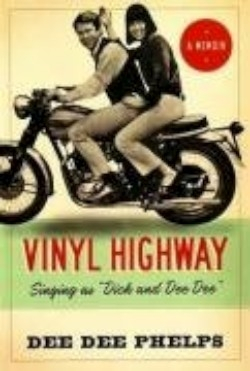Vinyl Highway
Singing as "Dick and Dee Dee"
Dick and Dee Dee were never big rock ‘n’ roll stars, never had a No. 1 hit in Billboard, but they came close. They flourished at a time when rock still glowed with a certain youthful innocence, back before gigantic corporate sponsorships and media conglomerates called the tune. It is that Garden-of-Eden quality that gives this book its charm.
In 1961, two kids from West Los Angeles, Dick Gosting (later St. John) and Mary Sperling, made their first mark on pop culture with the song “The Mountain’s High.” It would be their biggest hit, even though they would continue to release records throughout the decade and score modest successes with “Young And In Love,” “Turn Around,” and “Thou Shall Not Steal.” Looking for a catchy name, their first record label dubbed them Dick and Dee Dee (without securing her permission, the author laments).
The popularity of “The Mountain’s High” won Dick and Dee Dee a spot on a tour of Texas that starred Gary U. S. Bonds. The tour, for which they were each paid $150 a week, introduced the youngsters to the rough life on the road as well as to blatant racism, since Bonds and his band were blacks traveling with white performers through the segregated South. Subsequently, the duo toured for Dick Clark and became regular guests on the ABC-TV musical variety show, Shindig. For a brief period early in their career, their backup band was the Beach Boys.
As Phelps tells it, Gosting/St. John, who died in 2003, was always the dominant partner, writing their songs, taking credit for her lyrical contributions, and making all their career decisions—some of which were catastrophic. While she admits she found the music and the crowds exhilarating, Phelps never became as obsessed by the business as Dick. Much of her account deals with her unsatisfying relationship with Bill Lee, who began as Dick and Dee Dee’s booking agent and subsequently became their manager and her husband.
Dick and Dee Dee disbanded in 1969, although Dick afterward resurrected the act with his wife in the role of Dee Dee.
This book is not rigorous rock history. The author recalls conversations and even minor events with suspicious specificity. But it does work as a rock memoir, as a wistful recapturing of youthful excitement and pain. This alone makes it a valuable contribution. Moreover, there’s a trove of family and publicity pictures to sweeten the package.
Reviewed by
Edward Morris
Disclosure: This article is not an endorsement, but a review. The publisher of this book provided free copies of the book to have their book reviewed by a professional reviewer. No fee was paid by the publisher for this review. Foreword Reviews only recommends books that we love. Foreword Magazine, Inc. is disclosing this in accordance with the Federal Trade Commission’s 16 CFR, Part 255.

